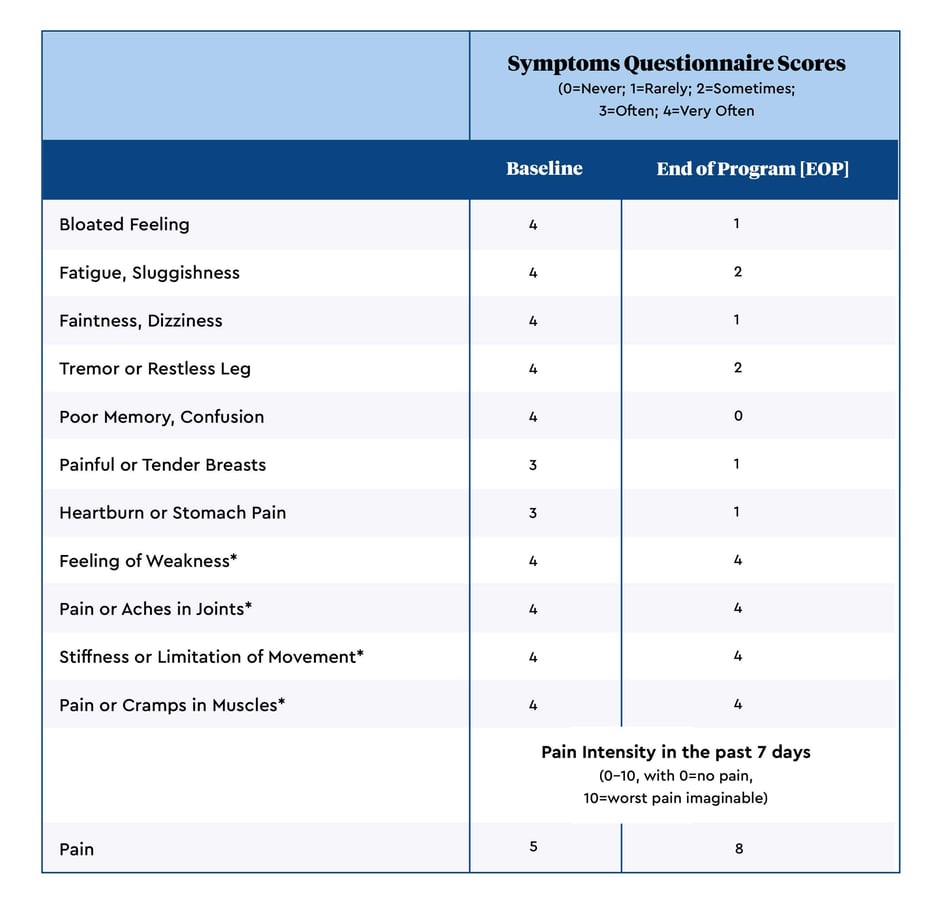Forty-Five-year-old Helena presented with COVID-19 in March 2020. Although it went untested, based on her symptoms, it is clear it was indeed COVID. As the months passed, she still was experiencing detrimental COVID-like symptoms, which we now know as Long COVID. Then she found the Mymee Core Program.
CASE OVERVIEW
Helena is a 45-year-old, previously healthy and active female, flight attendant and happily married wife and mother. Her family medical history includes a father who was diagnosed with both ankylosing spondylitis and rheumatoid arthritis.
She presented to her family physician in March 2020 with low-grade fever, lethargy, shortness of breath and myalgias. A diagnosis of COVID-19 was strongly suspected; however, no testing was done at that time. Helena’s symptoms slowly improved over the following 8 weeks with supportive care [see below for prescription medications], however she did not return to her baseline state of health.
In July 2020, Helena began to experience worsening fatigue, dizziness, as well as generalized weakness and malaise. A SARS-CoV-2 antibody test done in August 2020 was positive.
Between March and August 2020, she was prescribed different medications to help manage her symptoms, including albuterol and fluticasone inhalers, diazepam, diclofenac, ondansetron and meclizine.
In September 2020, when Helena enrolled in the Mymee program, she had discontinued prescription medications due to lack of sustained efficacy. She was taking Advil (800 mg qid) and Zyrtec (10mg qd), in addition to several supplements (an electrolyte drink TID, probiotics, vitamins D 2000 IU, B12 1000 mcg, B complex 100mg and C 1000 mg, as well as the minerals zinc 50mg qd and magnesium 225mg qd).
Helena self-reported to Mymee; frequent, debilitating symptoms including dizziness (“except while sitting still”), abdominal bloating, body pain, headaches, restless leg syndrome, fatigue and brain fog. She described even short walks as being “very difficult”, and that they resulted in severe bilateral hip pain and exhaustion.
Helena reported being aware that certain foods affected how she felt (named foods: chocolate and high fat milk products).
Helena had taken a year-long medical leave of absence from her job.
Helena’s primary goal was to return to her favorite outdoor activities.
PROGRAM ELEMENTS
Helena received access to the Mymee mobile app, which was then customized to match her specific symptoms and to make it easy for Helena to capture the relevant data required to correlate her specific symptoms with potential triggers in 5 minutes or less a day.
Helena was assigned a certified Mymee health coach trained on Mymee’s personalized trial & care platform, research, methodology, analytics and tools. The coach worked with Helena on a weekly basis to uncover specific correlations between symptoms and triggers, and to support the process of testing changes to eliminate triggers in safe, sustainable and practical ways that work for Helena’s lifestyle and environment. In addition to one-hour weekly calls, support included unlimited texts to ensure Helena’s time sensitive questions could be addressed between sessions.

KEY TRIGGERS AND ADJUSTMENTS
Helena’s case was highly complex, involving multiple triggers and nuanced adjustments: Exposures to gluten, dairy, spinach, tomato, and avocado in foods were all directly correlated to specific symptoms and required elimination to reduce symptoms. Fruits, grain and sugar consumption also triggered symptoms, however tolerable levels were identified, so full elimination was not required. Adequate protein in the morning, increased water intake, and guidance on nutrients to replace what was eliminated, all contributed Helena’s recovery and to reducing her high level of sensitivity to her exposome.
PROGRAM RESULTS: MEASURING REAL WORLD MEANINGFUL OUTCOMES
By the end of 13 sessions, a majority of Helena’s debilitating symptoms were resolved, and she was able to engage in activities she enjoyed, such as ice skating with her daughter. She reported that the pain she experienced at the end of the program (represented in the pain outcomes measured), was knee pain, which she associated with too much ice skating aggravating pre-existing chondromalacia, rather than the wide-spread myalgias she was experiencing when she enrolled in Mymee. (In Helena’s most recent follow up with Mymee in January 2021, she reported no pain.)
She shared with her coach that “the world used to be spinning around me, and here I am now out ice skating, spinning on the ice. I never thought I would reach this point by 13 weeks!”
CLINICAL SURVEYS AND REPORTED OUTCOMES AT BEGINNING AND END OF PROGRAM:
-
PROMIS® scores: Meaningful improvements achieved in 6 of 10 domains total, including:
-
Improvement of Cognitive Function by 20 points [minimally important difference 4.1-6.0]
-
Improvement of Fatigue by 17 [minimally important difference: 3.0-5.0].
-

*Note: Pain scores were specific to the knee at EOP versus the multiple sources of pain at baseline.
CASE SUMMARY
Mymee chose Helena’s real world case study to show how complex and unique COVID long haul cases can be for an individual to deconstruct and manage alone.
Helena’s case demonstrates how it is possible for individuals to use personalized data-driven trigger analytics and management support programs to regain health in meaningful ways.
Helena’s case is unique to her, but she is not alone in her suffering: It is now estimated that 24-38% SARS-CoV-2 infections can lead to sustained intermittent symptoms or what has been coined “Post-COVID Syndrome” or “COVID Long Haul.” In other words: over 10 million people in the U.S. alone.
KEY INSIGHTS & TAKE AWAYS
Mental and nutritional health are both very important in complex cases of COVID long haul. If you are not breathing well or are in pain, then it is hard to sleep well. If you are not sleeping well, if you don’t have the right nutrients. If you have no control over how you feel from one day to next, a perfect storm can lead to continuously worsening symptoms and a feeling of “no way out.”
The power of understanding that the disease is real, that all of what is happening is not in your head, the power of being able to understand your own data, is half the battle.
One of the biggest challenges is the blindfold and lack of control that comes with COVID long haul symptoms or any systemic autoimmunity disorder. If I don’t know when I am going to be hit with debilitating symptoms; how do I plan anything in advance, how do I sleep at night?
It is important to understand that
- The standard autoimmune protocol or elimination diets do not identify triggers specific to the individual
- “Dosing” of food can matter as much as dosing of medicine.
If someone is told to follow the elimination diet, and it does not capture all of their own triggers, they will be in a lose-lose scenario: They don’t get to eat their favorite food, they may be malnourished, while the missed triggers continue to make them sicker.
Learning how to draw very specific correlations between symptoms and triggers; having access to the data; seeing meaningful results based on your own actions; work together to take away the blindfold. Following “one-size-fits-enough” standard protocols or nothing at all; is a legacy of a time when it was not possible to offer personalized, well researched, data centric, and human-, technology and mobile -enabled approaches.
Although it is not easy to pay attention to any small infraction that might set your immune system off in a tailspin, having the data, tools, and support needed to regain control of one’s health can turn what sounds “impossible” in concept into practical, doable, and so worth it.
Many people with COVID long haul or systemic autoimmune disease struggle with too much on their plate and too little time. The worse the flare, the less healthy time to spare. The more time a protocol takes from an individual; the more standardized the protocol is to the general population versus to the individual’s specific symptoms, triggers and lifestyle, the more difficult it will be for the patient to adhere and achieve success.
For all of these reasons, a program that helps an individual identify and manage triggers must be personalized, minimize time consumption, and help gain back healthy time.
The pain scale used in patient reported outcomes has been one of the most challenging variables for the clinical research industry to tackle in order to get accurate measurements of the effect of drug and non-drug interventions.
This question of pain measurement is particularly challenging when it comes to autoimmunity. Living with autoimmunity requires compromises between what one wants to be able to do and what a body can tolerate without sending the immune system into overdrive.
As an individual regains mobility, and significantly reduces exhaustion, the door is suddenly opened to reenter life and maximize work, activity, time with family. Practically speaking, the more energy and mobility that someone with autoimmunity is able to regain, the more that individual will do.
The challenge is not only identifying triggers, but also helping individuals learn to spot early warning signals, and to help them find the right balance between everything that is possible to do and eat, and what their own highly unique reactive immune system can tolerate.
While Mymee used the pain 1-10 score to provide standard industry evaluation metrics, Mymee’s actual reporting engine allows consumers the opportunity to report based on what measures of symptoms are meaningful to them in the real world.


